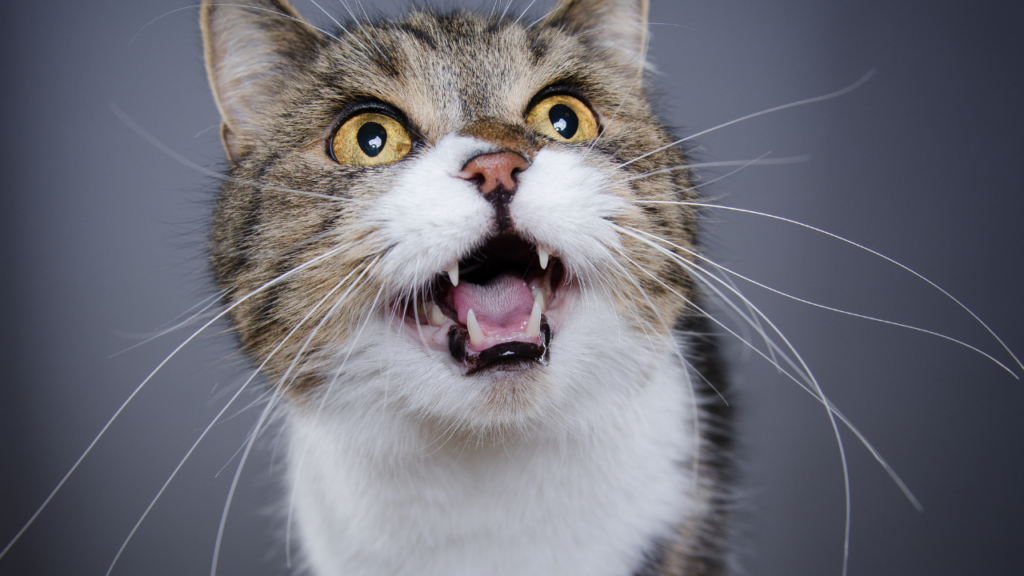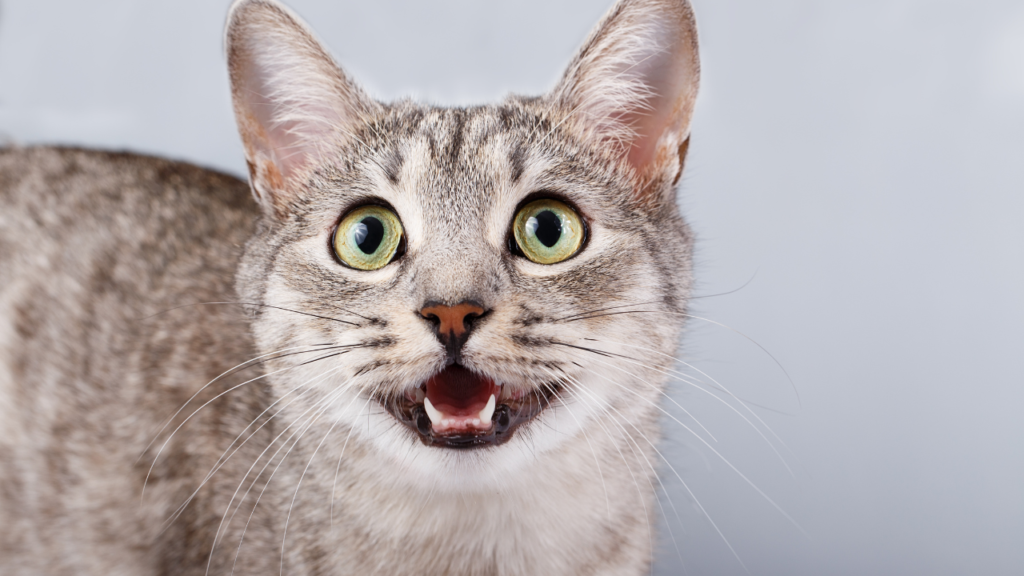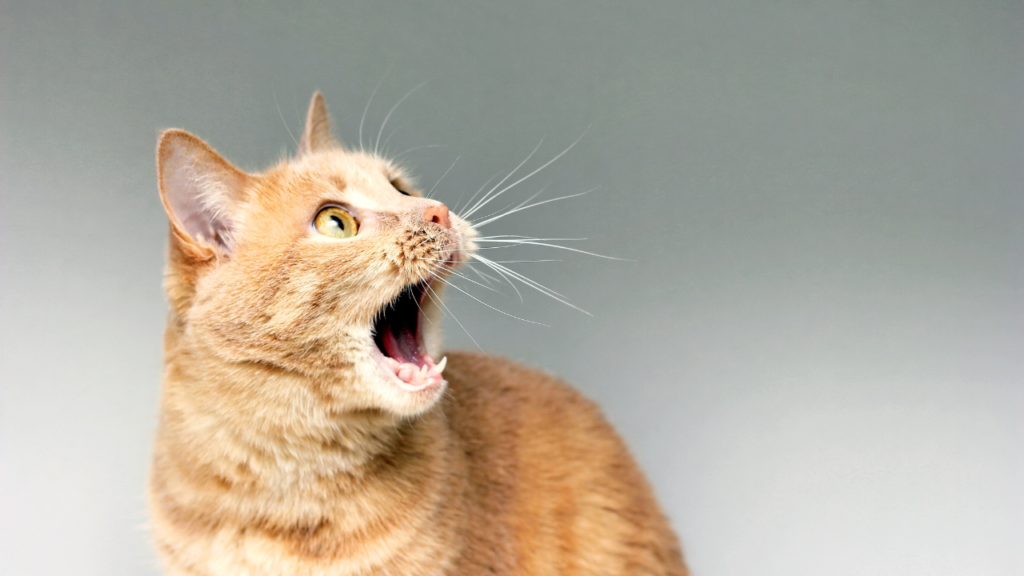
Cats meow (or don’t meow!) for a variety of reasons. It all starts with kittens, who meow to their moms when they are cold, hungry, or terrified. As they grow older, kittens acquire new methods to communicate and engage with other cats, usually by yowling or hissing. But meowing is an adult cat’s technique of communicating with humans. It’s lovely to have a conversation with your small tiger, but incessant meowing can be annoying. If you frequently wonder, “Why do cats meow so much?” you’re in the right place.

Why do cats meow at their humans?
First, there is some good news. Many of the meows you hear convey a good emotion. This implies that your cat becomes happy and only needs to express herself in her natural speech. However, vocalisations can sometimes disclose the polar opposite, requiring you to care for her. Excessive talking from a kitty indicates that she is not doing well and requires human attention. As with learning a new language, you should pay close attention to the timing, intonation, and context of your articulations. Essentially, trust your pet. If she’s in agony, you’ll know by the noises she makes, and you should take her to the vet as quickly as possible.
Why do cats meow?

To persuade your cat to stop meowing, you must first determine why they are doing so. sobbing for attention will elicit a different reaction than sobbing in agony. Here are some of the most common reasons cats meow all the time, as well as methods to help you both.
They’re lonely and wish to talk with you.
The issue: If your cat spends a lot of time at home without you, she may be lonely. Cats are not the most social creatures, but they do like companionship on occasion. Your cat may greet you when you arrive home or meow when she enters the room. Some cats enjoy mimicking humans and engaging in regular discussions.
The solution: Consider keeping some toys out to keep her entertained while you’re out. You can get a cat condo or interactive toys. You can also place a bird feeder outside her favourite window to attract birds and provide hours of pleasure, or watch a film designed specifically for cats on YouTube.
They want food.
The problem: Is your cat always whining whenever someone enters the kitchen, in particular? She’s definitely pleading for food, even if it’s not her typical lunchtime. Some cats become extremely noisy when they believe it is time to be fed.
To train your cat not to do this, do not feed her when she meows. Instead, wait till she’s calm before putting down her dish. Over time, she’ll understand that remaining quiet equals getting fed. You might also use an automatic feeder, which dispenses a bit of food at a certain time each day.
They seek attention.
The issue: Some cats meow when they seek attention. Cats enjoy being around people and may begin to communicate when they want to play or be petted.
The solution: To avoid her incessant meowing, consider giving her attention just when she is quiet. If she starts meowing again, look away or stop what you are doing, but don’t ignore her. Your cat wants to spend time with you. She need quality time each day for playing, grooming, and speaking. Schedule some pet time with your beloved companion, whether she is meowing at you or not.
They have a medical condition or are stressed.
The problem: Many diseases and disorders might make your cat hungry, thirsty, or in discomfort, resulting in excessive meowing. Examples of such medical disorders include kidney disease and an overactive thyroid. Stress can sometimes cause cats to become more loud. If you’ve just relocated, gained a new family member, or experienced any other substantial life changes, your cat may be stressed, which causes her to meow more.
The solution: This could be a significant issue. If you feel your cat is experiencing physical or mental suffering, make an appointment with your veterinarian for a thorough examination. They can give you advice on how to calm your anxious cat or devise a complete treatment plan to alleviate your cat’s discomfort.
They’re getting older.
The issue: As cats age, they might develop cognitive impairment and mental disorientation. They, like the elderly, can quickly become disoriented. This can make a cat weep more frequently, particularly at night.
The solution: A nightlight can help your cat feel more at ease if she becomes bewildered in the dark. However, this is best addressed by a veterinarian. They can tell if your cat is meowing because it is getting older. In addition, they can prescribe drugs to help her symptoms.
They want to breed.
The issue: If your cat is not spayed or neutered, she will be quite loud about her desire to breed. Female cats are usually louder than males. They will yowl when they are in heat (for every two to three weeks throughout the breeding season), and males will yowl if they detect a female cat in heat. Both, however, can be extremely unpleasant.
The solution: Have your cat spayed or neutered to avoid this type of meowing. Not only may this operation reduce excessive meowing, yet spaying or neutering your cat can also avoid a slew of other medical issues.
While meowing might be aggravating, it may also indicate that the cat is unhappy. You should not ignore your cat’s screams, whether they need more attention or medical care. When your cat meows, check on her to determine the cause of the noise. You can help fix your cat’s problem by determining why she is meowing. You may need to make time to play with her or plan a veterinarian appointment. However, with this approach, it will be easy to keep your cat from meowing excessively.
